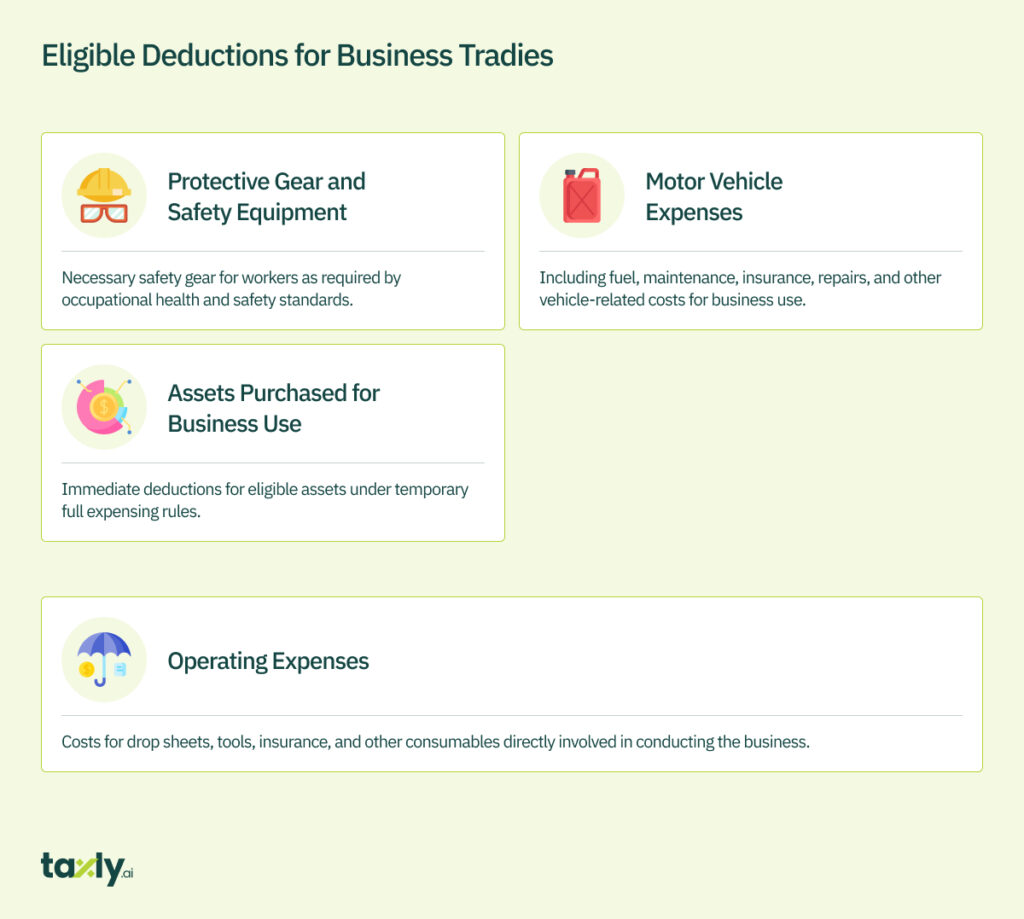Tradies are the backbone of hands-on expertise in Australia. When we talk about tradies, we mean carpenters, electricians, plumbers, mechanics, and all the other skilled professionals who work hard to get the job done right. Tradies are the ones building, fixing, and maintaining everything from structures to systems, using their specialized skills and hard-earned know-how. In Australia, there are certain ATO regulations for Tradies which everyone must follow.
Tax Return for Tradies – Key ATO FY 2023-24 Updates
- New fixed rate of 67 cents per hour, replacing previous rates, with stricter record-keeping for WFH Deductions.
- Expenses for tools related to the trade are still claimable.
- Deductions for work-related vehicle expenses (fuel, maintenance, insurance) remain applicable.
- Costs for courses, uniforms, and licensing fees might still be claimable, depending on trade requirements.
You Can Claim Tax Deductions for Employee Tradies If:
- The expense must have been paid by the individual without reimbursement.
- The expense should be directly linked to earning income within the trade or job.
- You have records and receipts to substantiate each claim and be able to provide evidence if requested by the ATO.
- The expense is for both work and private use, only claiming the portion directly related to work.
Work-from-Home Deductions:
The previous 80-cents-per-hour and 52-cents-per-hour fixed rates for work-from-home deductions are replaced by a new fixed rate of 67 cents per hour.
Let’s say you’re a tradie who worked from home and kept records of specific expenses like electricity, internet, and other work-related costs; now, instead of calculating each expense separately, you can use the new 67 cents per hour rate for your home office tasks.
Tools and Equipment:
Tradies can claim the full cost of tools and equipment under $300 immediately in the year of purchase. For items over $300, the cost can be claimed as a deduction spread over its useful life through depreciation.
- Permits, licenses, self-education expenses directly related to the trade.
- Phone/internet costs for work-related communication.
Consumables and Materials:
Deductions cover the cost of materials used for jobs. For instance, if a carpenter spends $500 on materials for a project, the full $500 can be claimed.
Vehicle Expenses:
Let’s say you use your vehicle for work purposes as a tradie, and you’ve kept a logbook detailing your work-related mileage. Expenses such as fuel, maintenance, insurance, and even depreciation related to your work usage can be claimed. This can significantly reduce your tax bill.
Fuel and Maintenance:
The ATO allows either the logbook method or the cents-per-kilometer method for claiming vehicle expenses. For example, the cents-per-kilometer rate for the 2023-24 financial year is 72 cents per kilometer.
Depreciation and Registration:
For depreciation, the effective life of the vehicle determines the claimable amount. Registration fees can also be claimed based on the percentage of work-related use.
Training and Education:
Courses and Workshops:
The full cost of courses and workshops directly related to your trade is deductible. For instance, if a plumbing course costs $1,500, the full $1,500 can be claimed.
Uniforms and Protective Clothing:
The cost of purchasing, repairing, or cleaning work-specific clothing or safety gear can be claimed. For example, if safety boots cost $150, that full amount is deductible.
- Hi-vis vests
- Steel-capped boots
- Safety goggles
- Helmets, and other safety gear necessary for the job.
Professional Union Fees and Memberships:
Membership fees for professional associations or unions related to your trade are fully deductible. For instance, if a trade association membership costs $300 annually, the full amount is claimable.
Work Related Travel Expenses:
Deductions apply to actual expenses incurred during work-related travel. Public transport fares or accommodation expenses for overnight stays can be claimed based on receipts.
Tool Repairs and Insurances:
Costs for repairing or insuring work tools and equipment are fully deductible. For instance, if repairing a tool costs $50, the full $50 is claimable.
- Power tools
- hand tools
- specialized equipment required for the trade.
- Example: A carpenter buying a new set of power drills.

Small Business Tradies Tax Deductions (Sole Traders, Partnerships, Companies, Trusts):
Protective Clothing or Items:
Safety gear and equipment required for occupational health and safety standards in the business.
Example: Safety helmets and gloves for a construction company’s employees.
Assets Purchased for Business Use:
Immediate deductions under temporary full expenses for eligible assets bought within specified dates.
Example: A landscaping business buying lawn mowers or tools for business use.
Suggested Read: Investment Property Tax Deductions in Australia Explained
Motor Vehicle Expenses:
Fuel, maintenance, insurance, and repairs for vehicles used for business purposes.
Example: A tradesperson using a van or ute for transporting equipment.
Other Allowable Expenses:
Costs incurred directly in running the business, such as drop sheets, tools, insurance, and computer consumables.
Example: A small construction company investing in new software for project management

Tax Offsets and Rebates for Tradies:
With the end of the low and middle-income tax offset (LMITO) on June 30, 2022, tradies might notice changes in their refunds or tax bills. This could mean a potential reduction in the refund or an increased tax bill for some individuals compared to previous years.
Do You Fall in the Tradie Category for Tax Return?
If you’re wondering whether you fall into the “tradie” category in Australia, consider the nature of your work:
Skilled Manual Work:
Are you engaged in a skilled trade that involves manual labor and specialized skills? This could include professions like carpentry, plumbing, electrical work, automotive mechanics, welding, painting, and similar hands-on roles.
Technical Expertise:
Do you have specialized training, qualifications, or apprenticeship in a specific trade? Tradies typically possess technical expertise gained through formal training or on-the-job experience.
Work Environment:
Do you predominantly work on-site, using your skills in various locations? Tradies often work in construction sites, homes, workshops, or other practical settings.
Industry Involvement:
Are you involved in industries such as construction, manufacturing, maintenance services, or similar fields that heavily rely on specialized tradespeople?
If your work aligns with these criteria, there’s a good chance that you fall into the “tradie” category in Australia.
How to File Tax Return for Tradies?
Step 1: Gather Necessary Documents
- Income Records: Collect payment summaries, invoices for any side jobs, or income statements from various sources.
- Expense Records: Gather receipts and records for work-related expenses, including tools, equipment, car expenses, protective gear, and other allowable deductions.
- Bank Statements: Organize statements showing any business-related transactions or income deposits.
Step 2: Understand Eligible Deductions
- Review Allowable Deductions: Ensure you understand the deductions you’re entitled to claim, such as protective clothing, tools, vehicle expenses, and other work-related costs.
- Know Specific Rules: Understand the rules for claiming each deduction, especially for items used partially for work and personal use.
Step 3: Choose a Filing Method
- MyTax Online: Use the ATO’s myTax online portal for a straightforward filing process if your situation is relatively simple and doesn’t involve complex deductions or multiple income sources.
- Engage a Tax Professional: Consider hiring a tax agent or accountant for more complex situations, maximizing deductions, or if you’re unsure about certain claims.
Step 4: Lodge Your Tax Return
- Using myTax:
- Create or log in to your my Gov account linked to the ATO.
- Access myTax and follow the prompts to input income details, deductions, and necessary information.
- Review and submit your return.
- Through a Tax Professional:
- Provide your tax professional with all income and expense records.
- They’ll prepare and file your tax return on your behalf, ensuring accuracy and compliance.
Step 5: Review and Confirm Details
- Double-Check Information: Before submission, review all details for accuracy, ensuring you’ve included all income and relevant deductions.
- Confirm Submission: Once satisfied, submit your tax return through the chosen method.
Step 6: Keep Records
- Retain Records: Keep all receipts, income statements, and tax-related documents for at least five years after filing your return.
- Document Future Expenses: Start a system to track expenses for the upcoming tax year to streamline future filing.
Step 7: Monitor Refund or Payment
- Monitor Progress: Keep an eye on your tax return’s progress, whether it’s a refund or a pending payment.
- Address ATO Queries: If the ATO requires additional information or clarification, respond promptly.
What to Keep Records For Tradie Taxes?
- Income Records:
- Payment summaries, invoices, or income statements from various sources (employer, subcontracting, side jobs).
- Bank statements showing income deposits related to work.
- Expense Records:
- Receipts, invoices, or proof of purchase for work-related expenses such as tools, equipment, protective gear, and materials.
- Records for car expenses, including fuel, maintenance, insurance, and repairs.
- Documentation for other allowable deductions, like permits, licenses, or self-education expenses directly linked to the trade.
- Business-Related Documents:
- Bank statements reflecting business transactions, especially for small business tradies (sole traders, partnerships, companies, trusts).
- Any contracts, agreements, or business-related correspondence.
How to Maintain Records:
- Organization:
- Keep records organized and categorized by type of expense or income source.
- Consider using digital tools or accounting software for easy recordkeeping.
- Receipts and Invoices:
- Store physical receipts securely in a designated filing system.
- For digital receipts, maintain a backup and ensure they’re easily accessible.
- Bank Statements:
- Keep bank statements in a secure location and ensure they’re available for at least five years after filing returns.
- Documentation of Deductions:
- Maintain a logbook for work-related car use if claiming car expenses.
- Create a spreadsheet or system to track other deductible expenses throughout the year.
How Long to Keep Records?
- Retain all tax-related documents, including receipts, income statements, and expense records, for a minimum of five years after lodging the tax return.
- If claiming depreciation on assets or deductions related to business equipment, keep records for these assets for at least five years following the final claim.
Additional Tips:
- Regularly update and review records to ensure accuracy and completeness.
- Clearly label and date documents for easy reference.
- Consider using cloud-based storage or digital apps for convenient and secure recordkeeping.
The Bottomline
Tradies return for tradies encompass various tax deductions. You can claim work-related expenses like tools, protective gear, and vehicle costs if they paid for these without reimbursement, keeping records to back up their claims. Employee tradies need expenses directly related to earning income, while small business tradies deduct costs necessary for conducting their business. Keeping accurate records and understanding eligible deductions are crucial for a successful tax return.
Explore More Topics


Comments are closed